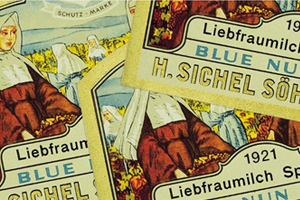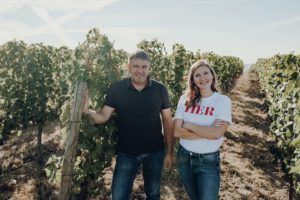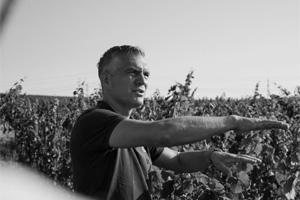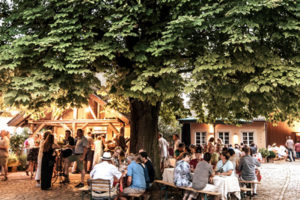Past

Labels of the German wine brand Blue Nun Credit: F. W. Langguth Erben GmbH & Co. KG
The Rheinhessen region is located between the cities Bingen, Alzey, Worms and Mainz. It is bordered to the north and east by the river Rhine. This region is mostly famous for its excellent Riesling wines, which originated in the Rhine region in the 15th century. However, the diversity of soils, microclimates and grape varieties in Rheinhessen give this region an almost indescribable variety of wines.
The Rhine region is the birthplace of the most famous German wine throughout the 18th, 19th and 20th century. Liebfraumilch originated in the vineyards around Worms and rised to an international brand in the 18th century. This wine shaped the image of German wine until the late 1990th and nourished especially in the US the common misconception that all German wine is overly sweet. In fact almost 50 % of German wine today is dry. Lately some new young winemakers are creating modern versions of Liebfraumilch.
Present
Today, many young and highly trained winemakers are breaking new ground in winemaking. They promote innovation in production and switch to sustainable agriculture. To do so, they use less pesticides and thin-out unripe berries to concentrate the strength of the vine on the few remaining grapes. Those winemakers introduce a completely new range of wine and plant new varieties of grapes. Beyond that, they design modern labels and present their wines in chic new wine shops, while still cherishing the long tradition of German winemaking.
In Rheinhessen there are numerous of winemakers who raise the profile and popularity of German wine worldwide – those of families with a long tradition of winemaking as well as those who just started making their name in the German winemaking scene.
Sustainability and women power at its best

Martina and Jörg Bernhard Credit: Winery Bernhard
One representative of this new German wine scene is Martina Bernhard-Fazzi. She works alongside her father Jörg at the winery Bernhard in Wolfsheim. Two generations of winemakers work together and share a common philosophy. Together they make distinctive and expressive wines, while still being devoted to animal- and plant-friendly farming. This means a lot of manual work and yield reduction – winemaking very close to the needs of nature to secure the soil for future generations of winegrowers.
Martina is a strong-willed and imaginative woman who has a vision – a true “Sister in Wine”. To support other women, she created the sisters in wine club with its six wines who bear the names of significant women in history. For six bottles sold, they donate € 1 to LAND-GRAZIEN – a counselling centre in northern Germany. It provides advice and various services to women and children experiencing violence in rural areas. Would you like to try a sip of the “Playful Frida” Kahlo?
A specialist in Riesling-wines

Philipp Wittmann Credit: Winery Wittmann
The winery Philipp Wittmann is based in Westhofen, a small town in the south of Rheinhessen. While the company’s history reaches back to the year 1663, the wine production started in 1921. In 2003 Philipp Wittmann switched to a bio-dynamic agriculture extending the organic production methods his parents already started in the 1980s. He is known for being a pioneer in organic winemaking in Germany. He is most passionate about and well known for his dry Riesling wines that carry the taste of Westhofen and Rheinhessen.
Picturesque surroundings and exceptional wine

Courtyard winery Wagner-Stempel Credit: Winery Wagner-Stempel
The winery Wagner-Stempel has a long tradition of winegrowing. The company has existed since 1845 and Daniel Wagner is the ninth generation to run the winery. In the midst of a landscape of steep hills of volcanic origin with heathland and pristine streams, he grows the classic grape varieties Silvaner, Pinot Blanc and of course, Riesling. The grape variety that is so typical of Rheinhessen is Daniel’s flagship. Fifty percent of the wine is made of Riesling grapes. Just as picturesque as the surroundings is the winery itself. You are always welcome to visit the beautiful courtyard around the old chestnut tree!
Mainz | Rheinhessen
Homepage winery Bernhard
Homepage winery Philipp Wittmann
Homepage winery Wagner-Stempel